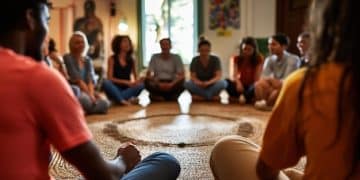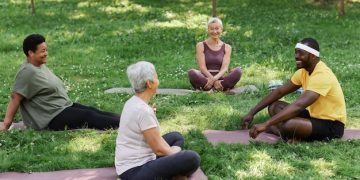Combatting Loneliness: 5 Proven Strategies for 2025

Combatting loneliness in 2025 involves adopting proven strategies such as fostering social connections, engaging in meaningful activities, practicing self-compassion, utilizing technology for connection, and seeking professional support, all aimed at improving mental health and overall well-being.
In an increasingly connected world, it’s paradoxical that feelings of isolation and combatting loneliness persist. As we look toward 2025, addressing loneliness has become more critical than ever for maintaining good mental health. Learning ways to cope can significantly enhance social life.
Understanding Loneliness and Its Impact
Loneliness isn’t just a feeling; it’s a complex emotional and psychological state that can significantly affect overall quality of life. Exploring its roots and different facets helps in understanding how it affects well-being.
The Difference Between Loneliness and Social Isolation
It’s essential to differentiate between simple isolation and deeper rooted loneliness. This understanding forms the basis for effective intervention and support.
- Loneliness: Subjective feeling of being alone or separated, irrespective of number of social contacts.
- Social Isolation: Objective measure of having few social contacts, which may or may not lead to loneliness.
- Impact: Understanding this distinction is crucial for healthcare and support services planning.
Loneliness, as a state, is characterized by a perceived discrepancy between one’s desired and actual social connections, not just the absence of company.
The Mental and Physical Health Consequences of Loneliness
Loneliness has far-reaching effects beyond just the emotional space. It can affect physical and mental wellness in powerful and tangible ways.
- Depression and Anxiety: Chronic loneliness often exacerbates symptoms of mental health disorders.
- Cardiovascular Issues: Studies link loneliness to higher risks of heart disease.
- Compromised Immunity: Lonely individuals are more susceptible to illnesses due to weakened immune responses.
Dealing with loneliness is becoming a huge part of prioritizing your health and wellness as a whole.

Recognizing the profound impacts of loneliness on mental and physical health underscores the urgency of finding effective strategies to combatting loneliness.
Strategy 1: Cultivating Meaningful Social Connections
The first line of defense against loneliness is deliberately fostering and nurturing strong, significant relationships. Focus on the quality of interactions over quantity of contacts.
Identifying and Nurturing Existing Relationships
Look around at the connections you already have; chances are there are connections that can be deepened.
- Quality Interactions: Regular communication can strengthen the bonds you share.
- Active Listening: Paying attention and showing genuine interest in conversations matters.
- Shared Activities: Doing things together creates memories and strengthens connections.
It’s about shifting from just going through the motions to engaging in a real way with others in your life.
Joining Groups and Communities with Shared Interests
Expanding one’s social circle by joining groups or communities with shared interests is critical in an increasingly individualized world.
- Local Clubs: Joining local book clubs or hiking groups to meet like-minded people.
- Online Forums: Participating online communities fosters connectivity, especially for niche interests.
- Volunteering: Engaging in volunteer work with groups builds new relationships and combats feelings of loneliness.
Seeking out spaces where interests align allows connections to emerge naturally, lessening the pressure of initiating new relationships.
Nurturing current relationships and seeking out groups that align with your passions can greatly enhance emotional well-being and combatting loneliness.
Strategy 2: Engaging in Purposeful Activities
Finding a sense of purpose can significantly reduce feelings of isolation and increase overall satisfaction. Activities offer avenues for expression and community.
Finding Hobbies and Interests That Provide Fulfillment
Dive into activities that bring you joy and a sense of accomplishment is key to banishing any lonely feelings. This will help build your confidence and social skills.
Participating in enjoyable activities, whether solo or in groups, helps foster a sense of identity and accomplishment. It is useful in combatting loneliness, especially when you find people with the same interests.
Setting Achievable Goals for Personal Growth
Setting and accomplishing goals, is useful in improving self-esteem and giving a sense of direction.
When these goals are related to social activities or community involvement, they offer additional opportunities to combatting loneliness and connect with others, improving social skills.
Finding activities that resonate with you is paramount; and setting goals ensures forward movement in your journey toward feeling connected and fulfilled.
Strategy 3: Practicing Self-Compassion and Mindfulness
Self-compassion involves treating oneself with the same kindness one would offer to a friend. Mindfulness encourages being present in the moment without judgment.
Understanding and Practicing Self-Kindness
Being kind to yourself is similar to being kind to others, it helps encourage good practices throughout the day that make you feel calmer.
- Acknowledge Imperfection: Recognizing that everyone has flaws can help reduce self-criticism.
- Treat Yourself with Patience: Being patient with oneself during trying times eases anxiety and promotes positive mindset.
- Encourage Affirmative Self-Talk: Changing self-critical monologues into positive ones greatly improves mental well-being.
Self-kindness shifts focus from negative self-talk to promoting a narrative of self-support and acceptance.
Mindfulness Techniques for Reducing Negative Thoughts
Mindfulness allows one to pause and observe thoughts without immediate reaction that cultivates emotional calmness.
- Meditation: Regular practice helps in focusing on the breath, and clearing mind from clutter.
- Awareness Exercises: Paying attention to details of everyday life, enhancing ability to connect with present.
- Journaling: Reflecting on daily experiences offers clarity and fosters emotional regulation.
Mindfulness offers practical tools for immediate management of thoughts and emotions, enhancing ability to stay level-headed even when grappling and combatting loneliness.

Practicing self-compassion helps in developing an inner source of strength, where mindfulness allows appreciation of life’s simple moments without overlaying thoughts.
Strategy 4: Leveraging Technology for Connection
In today’s digital age, technology offers innovative ways to connect, communicate, and battle social isolation; though careful use is critical.
Using Social Media Wisely to Enhance Relationships
Social media connects, informs, and entertains. Wise use turns digital tools into assets rather than liabilities.
Social media platforms provide unprecedented means to stay connected, share life updates, and support social relationships. Intentional use reduces alienation and actively promote feelings of social inclusion helpful in combatting loneliness.
Exploring Virtual Communities and Online Support Groups
Virtual communities and online support networks expand the scope of connection beyond physical proximity.
Joining communities centered around specific interests, hobbies, or conditions offers access to supportive environments, is helpful in combatting loneliness, and creates shared experiences.
When leveraging technology for interaction, it’s best to approach it as a tool to enhance existing relationships and facilitate new ones, rather than a replacement for real human connections.
Strategy 5: Seeking Professional Support
When feelings of loneliness become overwhelming or persistent, engaging with mental health professionals offers support and paths forward.
Understanding the Role of Therapy and Counseling
Therapy provides both safe space and professional expertise, to explore feelings, understand triggers and develop coping strategies.
- CBT (Cognitive Behavioral Therapy): Focuses on the relationship between thoughts, feelings, and behaviors.
- Group Therapy: Provides peer support in shared struggles and experiences.
- Individual Counseling: Offers tailored guidance for specific issues and challenges.
Professional guidance in therapy provides a clearer understanding of circumstances and enables creation of effective strategies. It is very helpful in combatting loneliness.
Identifying and Accessing Mental Health Resources
Locating and utilizing applicable mental health resources bridges treatment gaps and empowers individuals in health management.
- Local Clinics: Community mental health clinics supply affordable care.
- Telehealth Services: Virtual consultations broaden access especially in underserved areas.
- Employee Assistance Programs (EAPs): Many employers present mental health support as part of benefits packages.
Seeking support is not a sign of weakness, but rather an act of self-compassion and self-awareness in managing overall mental well-being and combatting loneliness.
| Key Strategies | Brief Description |
|---|---|
| 🤝 Meaningful Connections | Cultivate relationships by joining groups and nurturing bonds. |
| 🎯 Purposeful Activities | Engage in hobbies and set personal goals for fulfillment. |
| ❤️ Self-Compassion | Practice self-kindness and mindfulness to reduce negative thoughts. |
| 📱 Tech Connection | Use social media wisely and explore virtual support groups. |
Frequently Asked Questions
▼
Loneliness is a subjective feeling of being alone, regardless of social contact, while social isolation is an objective lack of social contacts. Recognizing this difference is crucial for effective intervention.
▼
Loneliness can lead to mental health issues like depression and anxiety, increasing risk of cardiovascular problems, and compromise the immune system, making individuals more susceptible to illnesses.
▼
Engage in quality interactions with existing contacts, actively listen to enrich conversations, participate in shared activities to create memories, and seek online or local groups to connect with people with shared interests.
▼
Self-compassion involves treating yourself with kindness, while mindfulness encourages being present. Practicing these techniques reduce self-criticism and promote a more positive, accepting mindset towards oneself.
▼
Professional help is recommended when loneliness feels constant and overwhelming. Counselors and therapists provide strategies to understand triggers and methods to build healthier relationships. Seeking support is a sign of strength, not weakness.
Conclusion
As we approach 2025, combatting loneliness remains a pressing issue for global mental health. By adopting strategies focused on connections, using technology smartly, and practicing kindness towards ourselves whilst seeking help when needed can provide improved ways of thinking. With these steps, a more connected and fulfilling year is achievable.





